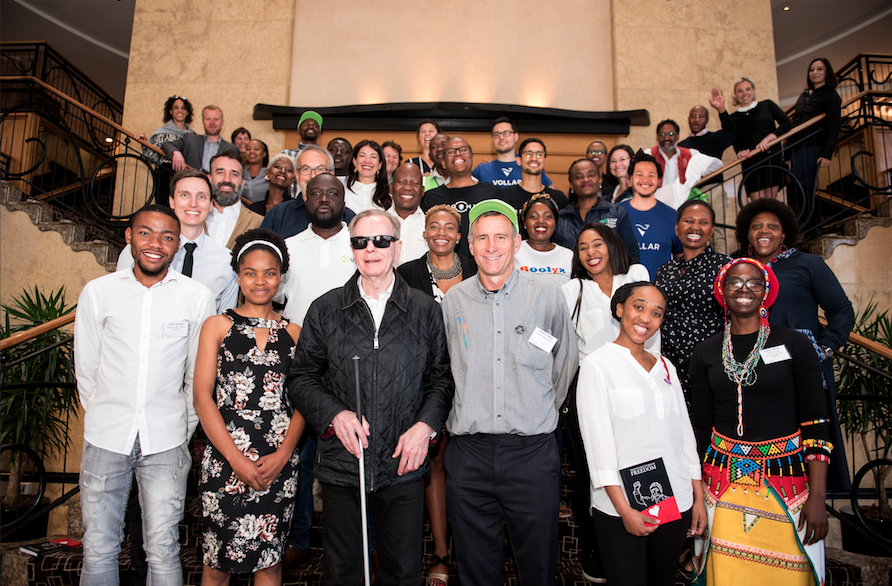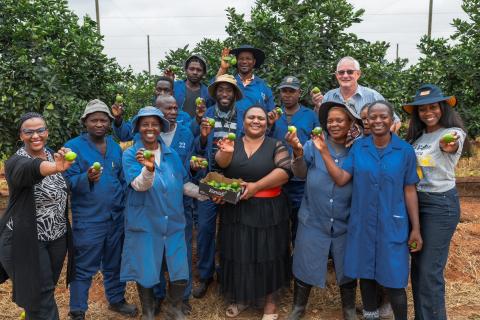
The SAB Foundation has selected 17 finalists in its 9th annual Social Innovation Awards 2019 and 3 finalists in its 4th annual Disability Empowerment Awards. The final winners will be announced at an official awards ceremony on Wednesday, 09 October 2019.
Grants will also be awarded to other deserving innovation finalists. The finalists were selected from over 300 entries this year and SAB Foundation Innovation Specialist, Ntandokazi Nodada says that since the programme was initiated 9 years ago the quality of innovations has been on the rise. “We are seeing some incredibly talented South Africans, from all walks of life, produce socially informed and transformative products and services that are truly going to help make a change in the lives of those who need it the most, ” says Nodada. Nodada says that the finalists tackle issues such as environmental sustainability, technology accessibility and disability inclusion.
Other than their potential to create positive societal change, the finalist’s innovations were selected according to whether the independent panel of judges assessments showed they were scalable and could be commercialised as well their potential to create job opportunities. The SAB Foundation Social Innovation Awards and Disability Empowerment Awards, were established as a means of supporting the growth and development of entrepreneurship in South Africa with a specific focus on servicing the needs of low-income women, the youth, people with disabilities and people living in rural areas.
“The SAB Foundation hopes to encourage individuals to empower themselves as entrepreneurs and in the process assist others with incredible but often simple resources which change the way our lives work,” says Nodada. Since its launch, the SAB Foundation has invested in over 160 social innovations through a financial commitment of more than R67 million.
The 2019 SAB Foundation Social Innovation Awards finalists are:
SOCIAL INNOVATION FINALISTS
KWAZULU NATAL
As part of the Denis Hurley Centre, Stuart Talbot established Street Booksellers, a programme that specialises in empowering unemployed and homeless men and women to sell second-hand books around Durban.
WESTERN CAPE
Jacques Sibomana established Kuba, software that allows small business owners to build a digital administrative track record and supplies them with supportive services that simplifies their trade with large corporate companies in and around Cape Town.
Nicolette Swartz, established Spoon Money with the idea of a multi-sided platform, which facilitates capital deployment to underserved communities who struggle to access the formal sector.
Kyle Ueckermann established Vollar, a digital currency incentive to uplift low income and informal settlements. Vollar provides disadvantaged individuals with a means to access essential products and services by earning Vollar incentives for bettering themselves or their communities.
Chad Robertson and his business partner, Nkazimlo Miti developed Regenize, a free, inclusive, and rewarding service that offers individuals rewards in form of virtual currency based on the weight of their recyclable materials.
Melisa Clayton Allardice established NuNanny, an online website that allows parents to connect, book, and pay for experienced nannies for babysitting and all kinds of childcare.
GAUTENG
Toli Altounis developed Put It Out - Mini Fire Extinguisher, a cost effective, non-toxic easy to use fire extinguisher.
Lungile Maile developed the NuMaths Kids App, a mathematics mobile application with 120 games that is designed to entertain and educate children between four and seven years old.
Jabulani Dlamini established Recycled Glass Turned Countertops, a business that specialises in collecting, weighing, and paying waste pickers for their recycled glass and manufactures it into countertops, floor and wall tiles, and sculptures.
Kutlwano Ngwarati established Boolyx Edu-Tech, an online platform for university students to access more affordable textbooks and academic publications. This platform allows students unlimited access to over 400,000 textbooks for a monthly subscription.
Ntombikayise Banda developed Robot Learn, a low-cost robotic platform designed to teach learners in their home language programming and engineering skills such as mechanics and electronics.
Grace Gichanga established Pro Se, a chatbot that provides practical and relevant legal information via chat platforms, such as WhatsApp and Facebook Messenger. Information is available 24 hours a day and is provided though text, video, audio, and images.
EASTERN CAPE
Luleka Mkuzo designed the Rural Technology Park, a mobile technology park equipped with multiple laptops to give learners and teachers of rural communities’ access to technology, the internet, and basic computer skills.
Professor Jean Greyling and his student, Byron Batteson, started working on the TANKS Coding App, a free mobile application that makes use of puzzles and image recognition to introduce learners to coding without the use of a computer. Byron first produced it for his BSc Computer Science Honours project at Nelson Mandela University.
FREE STATE
In 2016, Kekeletso Tsiloane successfully prototyped the PlastiBrick, an invention that uses recycled plastic to manufacture stock and maxi bricks that are strong, durable, fire retardant, and environmentally friendly.
NORTH WEST
Memphis Kaotsane from Taung, North West, developed Moonshine Reflective Paint designed to help reduce night-time collisions between vehicles and stray animals, livestock and cyclists when a car’s headlights reflect off it.
Sello Malinga developed the Spinetector Safety Costume, a safety suit that is used to minimise the impact of injuries sustained by mineworkers, when their upper bodies are hit by heavy machinery or rocks.
DISABILITY EMPOWERMENT AWARDS FINALISTS
WESTERN CAPE
Dr Daemon McClunan designed the OptiShunt, an implantable device that prevents blindness in glaucoma patients by draining excess fluid out of the eye while equalising pressure between the eye and the optic nerve.
GAUTENG
Xelda Rohrbeck was first introduced to the Showerβath, a combination of a shower and bathtub to enable easy bathing of individuals with profound intellectual and physical disabilities, who are unable to bath themselves and depend on caregivers. Lucy Slaviero designed the Showerβath, when she saw how caregivers struggled to bath particularly the elderly, with profound intellectual disabilities and limited mobility.
MPUMALANGA
Moleseng Mohlolo acted on the need for affordable and accessible chairs for disabled children. He custom made assortment of strong, low costSpecialised Seating for Disabled Children, which are environmentally friendly as they are made from cardboard boxes, paper and glue made out of flour and water.



